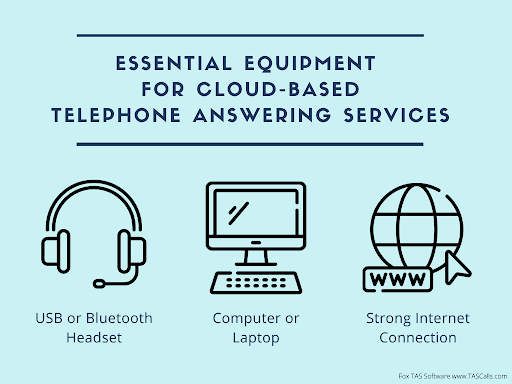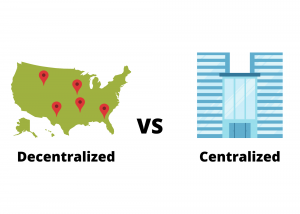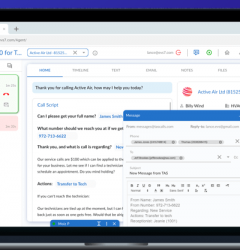
Entering into the TAS (Telephone Answering Service) industry has never been more affordable or achievable than it is now. The demand for outsourcing inbound calls is rapidly growing for businesses that are expanding and want to be cost-effective and resourceful with their time. When starting a TAS, however, there are a few things to consider that could either help or hinder your startup business. A number one priority is choosing the right answering service software.
What is a Telephone Answering Service (TAS)?
A telephone answering service acts as a virtual receptionist for companies needing to outsource their inbound calls. Before using a TAS, companies had their missed calls sent to voicemail and would return the customers calls later since they had to tend to other tasks that were more time-sensitive. Whereas with the TAS, the calls can be sent directly to a live answering service to answer calls in real-time. The customer’s needs can be met in a timely manner and the company can still focus on the other tasks at hand.
Answering Service From Home or From an Office: Pros and Cons
One of the first decisions you’ll need to make is whether the company will work from one location or have everyone work remotely. Due to the nature of the service and advances in technology, answering services can successfully operate from a centralized location like an office building or can be decentralized. In a decentralized office an answering service operator can work from any location including their home. There are pros and cons to both options so it is important to evaluate the practicality, cost-effectiveness, and legal aspects of both, to ensure your company startup is well informed and well equipped. Now a days, it’s even possible to run an AI Phone Answering Service with voice agents, meaning you wouldn’t even need to hire labor. You’d just setup voice agents with custom instructions using AI that can answer calls like a real operator.
How to Start an Answering Service From Home
It is intimidating for a startup business to allow employees to work remotely because there is a risk that the business might not be able to function as it would if everyone was in one building. While it is true that the manager will have less control over the day-to-day and will have to train employees virtually, it doesn’t necessarily mean that your business quality will be lacking. With the right management and a good understanding of how the business works, your startup company can successfully work from home. A benefit to your business working remotely is that it will have a large pool of eligible employees to choose from since there are no commuting limitations. Your company can also be more selective on who is hired, for instance, you could hire only individuals who have experience in the industry. This would eliminate the need for extensive training over the computer.
If your company wants to have positive synergy, then creating an environment that puts emphasis on communication and team cooperation can help with making the company function as if everyone were in the same building. You’ll have to go with a cloud-based TAS software to be able to successfully operate with remote agents (reach more about that below). The TAS system you use might also offer the option to monitor and coach the employees as they take calls, which is a helpful feature to work closely with employees who are working remotely.
How to Start an Answering Service From an Office
Operating from a centralized location has been the most preferred method of running a business because having the employees in one location is proven to allow the manager more control over quality assurance, sharing of data, and collaboration between roles in the company. In most cases, it is also more cost-effective to insource the roles in the company because you aren’t having to pay fees, monthly retainers, or commissions for a third party. One downside to working in a centralized location is that the eligible employees are more limited than if the company was hiring remotely. This might not be a problem if you are located in a big city, but if the company is in a more rural area it could be challenging to find suitable employees. However, having employees come into work can make it easier to train and assist them in answering and responding to calls. The decision comes down to the manager’s preference and how much control they are wanting to have day-to-day.
Write a Business Plan For Your Telephone Answering Service
When writing a business plan for your company you should seek assistance from a lawyer and an accountant in the industry to guide decision-making for legal protection and tax strategy. A lawyer and accountant will be able to determine what business entity is best for you. For example:
- LLC (Business structure where owners are not personally liable for companies debts or liabilities)
- Sole proprietorship (Business structure that has just one owner who pays personal income tax on profits earned from the business)
- Partnership (Business structure where partners share liabilities and profits equally)
- S-corp (Legal entity that elects to pass corporate income, losses, deductions, and credits through to their shareholders for federal tax purposes)
- C-corp (Legal entity that is separate from its owners)
For this type of business, it would be wise to choose between LLC, S-corp, or C-corp because these entities protect personal assets from business liability. Once the entity is decided, your accountant will be able to set up the foundation for accounting, payroll, and record keeping.
Your lawyer and accountant will be able to work together to ensure your company’s legal safety, but for extra measure, an errors and omissions insurance policy is highly recommended. This insurance protects against someone suing the company based on mistakes in answering the phone, taking a message, or giving information to a caller. It will also protect your company in the event that an employee fails to reach a client with an urgent message, resulting in loss of business for the client. If your company wants errors and omission insurance, find a company that has offered the policy to other answering services, so the company has an idea of what your company’s specific needs are.
A basic budget will need to be formed with estimations of income, which you will want to undershoot, and estimations of the expenses, which you will want to overshoot. Also take into consideration your investors and any borrowed money into the budget. When estimating for the breakeven point, give more than enough time to meet that goal, because it tends to be much later than many businesses plan for. With a business plan that undershoots income, overshoots expenses, and sets the breakeven day well into the future, the business has a better idea of the possible losses until that time. As the business begins expanding and you receive more clients, the business plan will need to be updated to make sense with where the company’s growth is at.
Respond to All Legal Requirements When Starting an Answering Service
Both a lawyer and an accountant will be necessary assets in responding to all legal requirements. It is best to make sure the accountant and lawyer either live in the region or have worked closely in the area you choose to locate your business because there are likely legal requirements specific to the location. Obtaining the required permits and licenses can take time since plans will have to be submitted to city council, state departments, and federal departments for approval or revision. Some basic permits and license that every startup business in America must obtain are:
- Health permits
- Environmental permits
- General business license
- Federal/state tax identification number
- Sales tax permit
If your company chooses to allow employees to work from home, it’s possible that your state/city will still require the standard permits of your business and most will require the home occupation permit. To ensure your company is meeting all requirements and legal regulations check the Small Business Administration’s website.
Basic Equipment To Start An Answering Service
The equipment you need to run a telephone answering service will largely depend on your software vendor and the type of setup you want. Before the recent modern cloud-based software available now, companies used to have a separate line for each client. This was super hard to manage, exhausting, and expensive. In this day and age, there are cloud-based options where you will no longer be required to own expensive on-premise hardware or telephone lines in-house to operate your answering service.
The essential equipment required for using a cloud-based software platform:
- Good internet connection
- A computer for each employee hardwired to the modem or router
- USB or Bluetooth headset for each operator (agent)
We won’t go into detail about other standard business equipment you may need if you’re running your TAS from an office, such as desks, chairs, etc, but you’ll want to think through those items as well depending on your specific setup.

Software To Start An Answering Service
Finding the right answering service software type is critical to the success of your answering service. Traditionally, answering services required expensive on-premise hardware and used standard telephone lines, and there are still many companies out there providing these outdated types of solutions. Some others have become hybrid on-premise / cloud / software-based solutions. Companies providing these services often charge $10,000-$25,000 just in startup fees and may take up to 6 months to onboard your company. In addition, they may require you to go out and shop around for phone service, texting service, phone numbers, and more.
Fortunately, there is a trend towards fully cloud-based systems, like the telephone answering service software that is offered by EVS7. In this case, all that’s needed is access to a web browser along with a headset and good internet connection.
Here is a list of important things to consider when shopping for an Answering Service software provider:
- Ability to bring up client information quickly depending on who calls
- Intuitive scripting and an easy to use interface
- Customization for important information for each client
- Ability to quickly transfer calls
- Omni-channel communication with the client (such as voice, text, and email)
- Management portal for updating client details
- Reporting for phone calls and time tracking
- Ability to scale up and down agents quickly
- Quick deployment and updates on the fly
- Billing and invoicing options
- All-inclusive options and unlimited calling
EVS7’s Fox Answering Service software meets each of these items and a free demo is available on the website.
What Comes After Starting An Answering Service
After the company has purchased the necessary equipment, gotten all licenses and permits, hired/trained the staff, and begins serving clients, the company must strive to meet the breakeven point. In order to do this, the company must maintain the current clients, while also striving to consistently gain more clients. The focus then becomes how to make the services, marketing, and management even more effective and efficient as you scale up.
Although the service your company is offering might be adequate for receiving new customers, your company needs to consistently improve upon itself to keep a competitive advantage. Therefore, research and survey the customers’ needs and deliver them on a regular basis.
To improve on the company’s marketing, use your online platforms to upload blogs, informative posts, and updates in order to retain more attention on the internet. Also, find a trustworthy Search Engine Optimization company to help grow your brand, it will be worth the money in the long run, and your company will benefit immensely from the marketing through search engine technology.
When managing the company, be constantly observing competitors in the industry, learn from them and make your service more desirable than theirs. Lastly, stay informed about the changes in the industry to be sure your company is never behind on software updates or new services that are being offered by other companies.
Once the breakeven point is accomplished, the company will be able to pay back any loans and investors. Then the company will be solely profiting and growing as it continues the process of updating and delivering its telephone answering service.
Continue reading our guide on how to start a virtual call center, where you could also find helpful tips.
Works Cited
Dehaan, Peter Lyle. How to Start a Telephone Answering Service. Coppell, Advanced Call Center Resources, 24 October 2020.
Apply for licenses and permits. 2020. Apply For Licenses And Permits. [online] Available at: <https://www.sba.gov/business-guide/launch-your-business/apply-licenses-permits> [Accessed 23 November 2020].
“S Corporations | Internal Revenue Service”. Irs.Gov, 2020, https://www.irs.gov/businesses/small-businesses-self-employed/s-corporations#:~:text=S%20corporations%20are%20corporations%20that,shareholders%20for%20federal%20tax%20purposes. Accessed 24 Nov 2020.
ReceptionHQ. 2020. Telephone Answering Service | Receptionhq. [online] Available at: <https://www.receptionhq.com/telephone-answering-service> [Accessed 23 November 2020].
Twin, Alexandra. “Sole Proprietorship: What You Should Know”. Investopedia, 2020, https://www.investopedia.com/terms/s/soleproprietorship.asp. Accessed 24 Nov 2020.




